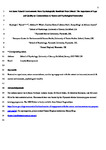Are Some Natural Environments More Psychologically Beneficial Than Others? The Importance of Type and Quality on Connectedness to Nature and Psychological Restoration
| dc.contributor.author | Wyles, Kayleigh | |
| dc.contributor.author | White, MP | |
| dc.contributor.author | Hattam, C | |
| dc.contributor.author | Pahl, Sabine | |
| dc.contributor.author | King, H | |
| dc.contributor.author | Austen, Melanie | |
| dc.date.accessioned | 2020-05-19T16:40:18Z | |
| dc.date.available | 2020-05-19T16:40:18Z | |
| dc.date.issued | 2019-02 | |
| dc.identifier.issn | 0013-9165 | |
| dc.identifier.issn | 1552-390X | |
| dc.identifier.uri | http://hdl.handle.net/10026.1/15692 | |
| dc.description.abstract |
<jats:p>Exposure to nature can strengthen an individual’s sense of connectedness (i.e., emotional/cognitive bonds to the natural world) and enhance psychological restoration (e.g., feeling relaxed/refreshed). To date, there have been few large studies looking at the role that type and quality of natural environments may have on these outcomes. The present study used data from a large survey in England (sample analyzed = 4,515), which asked participants to recall a recent visit to nature. After controlling for covariates, respondents recalled greater connectedness to nature and restoration following visits to rural and coastal locations compared with urban green space, and to sites of higher environmental quality (operationalized by protected/designated area status, for example, nature reserves). A series of structural equation analyses provided evidence for a bidirectional association between connectedness and restoration. Consideration of the psychological benefits associated with different types and quality of environment has implications for human health, environmental management, and conservation.</jats:p> | |
| dc.format.extent | 111-143 | |
| dc.language | en | |
| dc.language.iso | en | |
| dc.publisher | SAGE Publications | |
| dc.subject | restorative experiences | |
| dc.subject | nature connectedness | |
| dc.subject | monitoring engagement with the natural environment | |
| dc.subject | terrestrial and marine environments | |
| dc.subject | psychological benefits | |
| dc.title | Are Some Natural Environments More Psychologically Beneficial Than Others? The Importance of Type and Quality on Connectedness to Nature and Psychological Restoration | |
| dc.type | journal-article | |
| dc.type | Journal Article | |
| plymouth.author-url | https://www.webofscience.com/api/gateway?GWVersion=2&SrcApp=PARTNER_APP&SrcAuth=LinksAMR&KeyUT=WOS:000454503000001&DestLinkType=FullRecord&DestApp=ALL_WOS&UsrCustomerID=11bb513d99f797142bcfeffcc58ea008 | |
| plymouth.issue | 2 | |
| plymouth.volume | 51 | |
| plymouth.publication-status | Published | |
| plymouth.journal | Environment and Behavior | |
| dc.identifier.doi | 10.1177/0013916517738312 | |
| plymouth.organisational-group | /Plymouth | |
| plymouth.organisational-group | /Plymouth/Faculty of Health | |
| plymouth.organisational-group | /Plymouth/Faculty of Health/School of Psychology | |
| plymouth.organisational-group | /Plymouth/Faculty of Science and Engineering | |
| plymouth.organisational-group | /Plymouth/Faculty of Science and Engineering/School of Biological and Marine Sciences | |
| plymouth.organisational-group | /Plymouth/REF 2021 Researchers by UoA | |
| plymouth.organisational-group | /Plymouth/REF 2021 Researchers by UoA/UoA04 Psychology, Psychiatry and Neuroscience | |
| plymouth.organisational-group | /Plymouth/REF 2021 Researchers by UoA/UoA04 Psychology, Psychiatry and Neuroscience/UoA04 Psychology, Psychiatry and Neuroscience MANUAL | |
| plymouth.organisational-group | /Plymouth/REF 2021 Researchers by UoA/UoA14 Geography and Environmental Studies | |
| plymouth.organisational-group | /Plymouth/REF 2021 Researchers by UoA/UoA14 Geography and Environmental Studies/UoA14 Geography and Environmental Studies MANUAL | |
| plymouth.organisational-group | /Plymouth/Research Groups | |
| plymouth.organisational-group | /Plymouth/Research Groups/Centre for Brain, Cognition and Behaviour (CBCB) | |
| plymouth.organisational-group | /Plymouth/Research Groups/Centre for Brain, Cognition and Behaviour (CBCB)/Behaviour | |
| plymouth.organisational-group | /Plymouth/Research Groups/Institute of Health and Community | |
| plymouth.organisational-group | /Plymouth/Users by role | |
| plymouth.organisational-group | /Plymouth/Users by role/Academics | |
| plymouth.organisational-group | /Plymouth/Users by role/Researchers in ResearchFish submission | |
| dcterms.dateAccepted | 2017-10-15 | |
| dc.identifier.eissn | 1552-390X | |
| dc.rights.embargoperiod | Not known | |
| rioxxterms.funder | Natural Environment Research Council | |
| rioxxterms.identifier.project | PML Sea and Society (environment, human health, biodiscovery and socio-economics) | |
| rioxxterms.versionofrecord | 10.1177/0013916517738312 | |
| rioxxterms.licenseref.uri | http://www.rioxx.net/licenses/all-rights-reserved | |
| rioxxterms.licenseref.startdate | 2019-02 | |
| rioxxterms.type | Journal Article/Review | |
| plymouth.funder | PML Sea and Society (environment, human health, biodiscovery and socio-economics)::Natural Environment Research Council |


